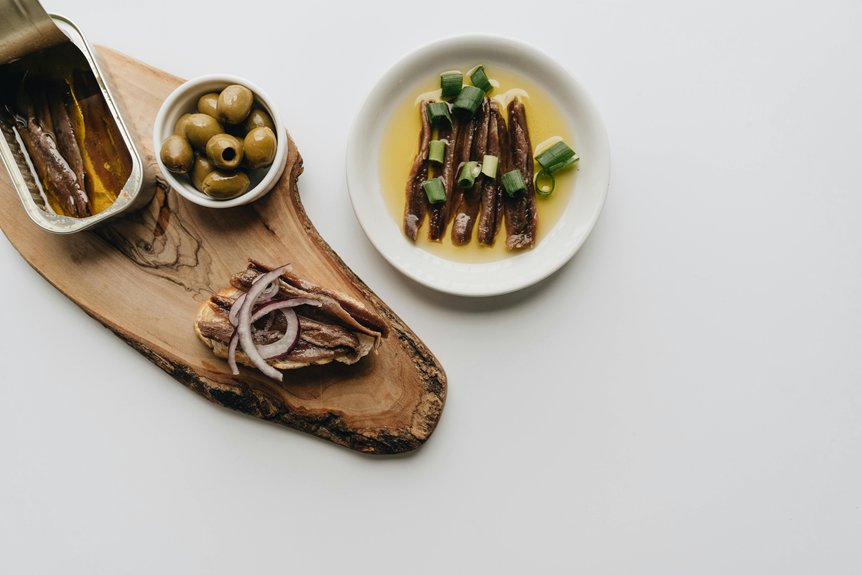
Can you simmer onions with olive oil? Absolutely, and it’s a cornerstone of Mediterranean cooking. This technique not only softens onions but also allows their natural sugars to caramelize, creating a rich flavor base for many dishes. With the right approach, you can elevate your culinary creations while reaping health benefits. Ready to explore how to master this essential method and enhance your meals? Let’s get started.
The Role of Onions in Mediterranean Cuisine
Onions play an essential role in Mediterranean cuisine, adding depth and flavor to countless dishes. When you sauté or simmer them, their natural sweetness emerges, transforming your meals. You’ll find onions in everything from hearty stews to fresh salads, providing a foundation for many recipes. They’re not just a supporting player; they elevate the entire dish. You can experiment with different varieties, like red, yellow, or sweet onions, to find your preferred taste. Beyond flavor, onions bring nutritional benefits, including vitamins and antioxidants. So, when you’re preparing Mediterranean dishes, don’t underestimate the power of onions. Embrace their versatility and let them shine, knowing they’re a key ingredient in creating vibrant, satisfying meals that resonate with the essence of this rich culinary tradition. Additionally, incorporating high-quality olive oil, such as Gundry MD Olive Oil, can enhance the health benefits of your dishes while elevating their flavor profile.
Understanding Olive Oil: Types and Benefits
While you might associate olive oil primarily with Mediterranean cooking, its versatility and health benefits make it a staple in kitchens around the world. There are several types of olive oil to choose from, including extra virgin, virgin, and refined. Extra virgin olive oil is the highest quality, boasting rich flavor and numerous antioxidants. It’s perfect for drizzling over salads or dipping bread. Virgin olive oil is slightly less intense but still offers great flavor and health benefits. Refined olive oil has a higher smoke point, making it suitable for high-heat cooking. Incorporating olive oil into your diet can support heart health, reduce inflammation, and enhance nutrient absorption. Embrace these benefits and liberate your cooking experience!
The Science Behind Simmering Onions
Simmering onions in olive oil not only enhances their flavor but also reveals a fascinating chemical transformation. As the heat gradually softens the onions, their natural sugars caramelize, creating that rich, sweet taste you love. This process also breaks down the onion’s cell walls, releasing essential oils that infuse your dish with depth and complexity. The olive oil plays an essential role, acting as a medium that helps distribute heat evenly and prevents burning. By controlling the temperature, you can coax out those delicious flavors, allowing the onions to develop a golden color without losing their vibrant essence. Embrace this culinary alchemy, and you’ll reveal the true potential of your dishes, transforming simple ingredients into extraordinary experiences.
How to Properly Sauté Onions in Olive Oil
To properly sauté onions in olive oil, start by choosing the right onions and slicing them evenly for consistent cooking. Yellow onions are a great choice for their natural sweetness and versatility. Heat a generous amount of olive oil in a pan over medium heat. Once the oil shimmers, add your sliced onions and stir gently. Keep an eye on them, allowing them to soften and turn golden without burning. This process usually takes about 10-15 minutes. If you want to enhance the flavor, consider adding a pinch of salt to draw out moisture. Stir occasionally, and enjoy the fragrant aroma filling your kitchen. Remember, patience is key—the goal is to achieve that perfect caramelization that elevates your dishes.
Flavor Profiles: Enhancing Dishes With Onion and Olive Oil
Sautéing onions in olive oil not only develops their natural sweetness but also creates a flavor foundation that enhances a variety of dishes. This aromatic duo infuses your cooking with depth, making it perfect for soups, stews, and sauces. The rich, fruity notes of olive oil complement the caramelized onions, adding complexity and richness. As you experiment, you’ll discover how they elevate your ingredients, whether it’s vegetables, grains, or proteins. The balance of savory and sweet awakens your palate, encouraging creativity in the kitchen. You’ll find that this simple technique liberates your culinary skills, transforming ordinary meals into extraordinary experiences. So, embrace the magic of onion and olive oil, and watch your dishes come alive with flavor.
Common Mediterranean Dishes That Use This Technique
While exploring Mediterranean cuisine, you’ll find that many beloved dishes showcase the delightful combination of simmered onions and olive oil. Take ratatouille, for example; the fragrant base of slowly cooked onions mingles with vibrant vegetables, creating a comforting harmony. Then there’s the classic sofrito, a staple in Spanish and Italian cooking, where sautéed onions form the flavorful foundation for stews and sauces. You can’t forget about the luscious onion and olive oil blend in a traditional Greek moussaka, enhancing the dish’s complexity. Even a simple pasta aglio e olio benefits from the depth of flavor that simmered onions bring. By incorporating this technique, you’re embracing the essence of Mediterranean cooking, revealing a world of taste and tradition.
Tips for Perfectly Simmered Onions
Achieving perfectly simmered onions requires attention to detail and a few key techniques. Start by slicing your onions evenly to guarantee consistent cooking. Use a good quality olive oil, heating it gently in a pan over medium-low heat. Add the onions once the oil shimmers, and stir occasionally to prevent sticking. Patience is vital—allow the onions to cook slowly, releasing their natural sweetness. If they begin to brown too quickly, lower the heat. Season with a pinch of salt to enhance flavor. You can also add herbs or spices for an extra kick. Finally, keep an eye on texture; you want them soft and translucent. With practice, you’ll master the art of simmering onions to perfection.
Health Benefits of Cooking With Olive Oil and Onions
Cooking with olive oil and onions not only enhances your dishes but also offers numerous health benefits. Olive oil is rich in monounsaturated fats, which can help lower bad cholesterol levels and reduce your risk of heart disease. It’s packed with antioxidants that fight inflammation and promote overall wellness. Onions, on the other hand, are loaded with vitamins, minerals, and quercetin, a powerful antioxidant that supports immune function. Together, they create a flavorful combination that aids digestion and boosts metabolism. By incorporating these ingredients into your meals, you’re not just nourishing your body; you’re also embracing a healthier lifestyle. So, release your culinary creativity and enjoy the delicious health benefits of cooking with olive oil and onions!
Variations: Adding Herbs and Spices
Elevating your simmered onions with the addition of herbs and spices can transform a simple dish into a culinary delight. Fresh herbs like thyme, rosemary, or basil bring vibrant flavors that enhance your onions’ natural sweetness. A pinch of crushed red pepper or black pepper adds a kick, while garlic infuses depth. Don’t shy away from experimenting with spices like cumin or coriander for an exotic twist.
If you’re feeling adventurous, try a splash of balsamic vinegar or a squeeze of lemon juice to brighten the dish. Remember, the key is balance; let the herbs and spices complement rather than overwhelm your simmered onions. These variations will not only elevate your cooking but also liberate your taste buds. Enjoy the journey!
Beyond the Basics: Creative Uses for Simmered Onions
Simmered onions are more than just a side dish; they can be the star ingredient in a variety of culinary creations. You can fold them into creamy risottos, adding depth and sweetness to each bite. Try incorporating them into pasta sauces for a rich, savory flavor that elevates your dish. Mix them into frittatas or omelets for a hearty breakfast that energizes your day. Blend them into soups for a silky texture and complex taste. You can even use simmered onions as a base for homemade dips or spreads, transforming simple snacks into gourmet experiences. With just a little creativity, simmered onions can liberate your cooking, turning ordinary meals into extraordinary delights.





